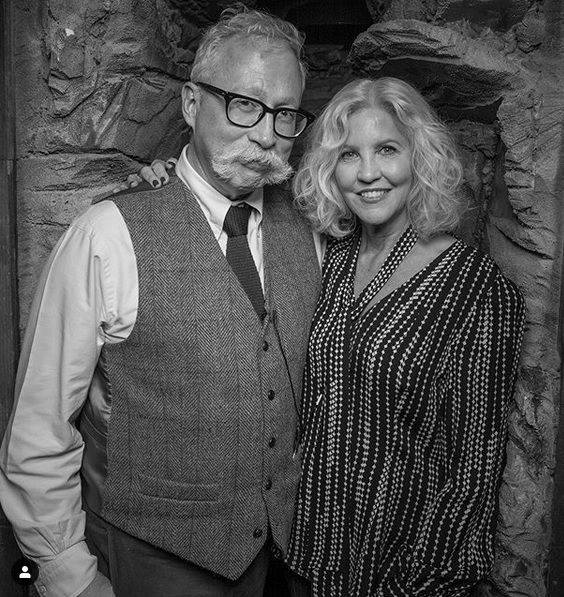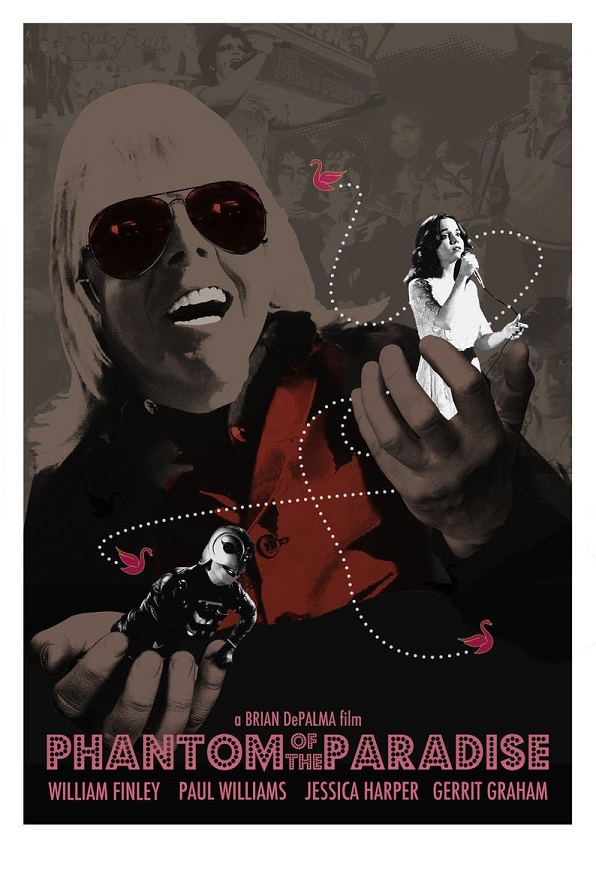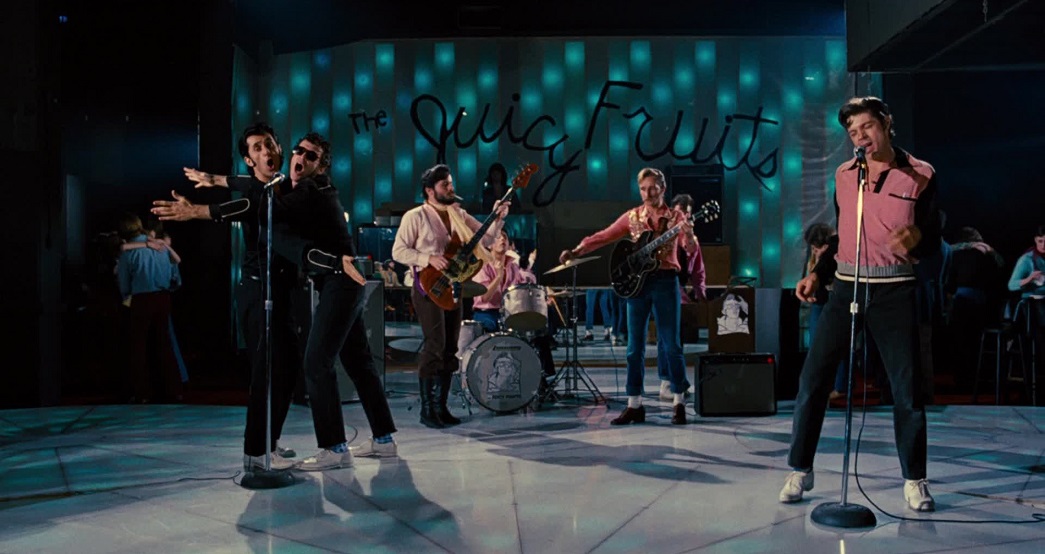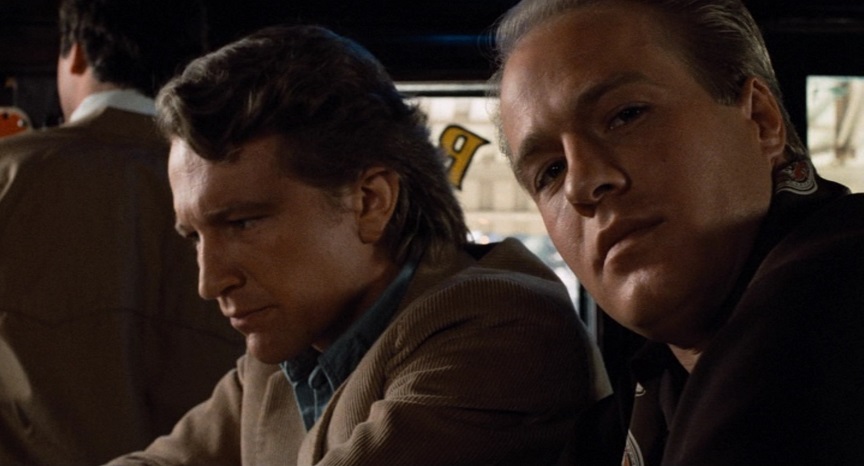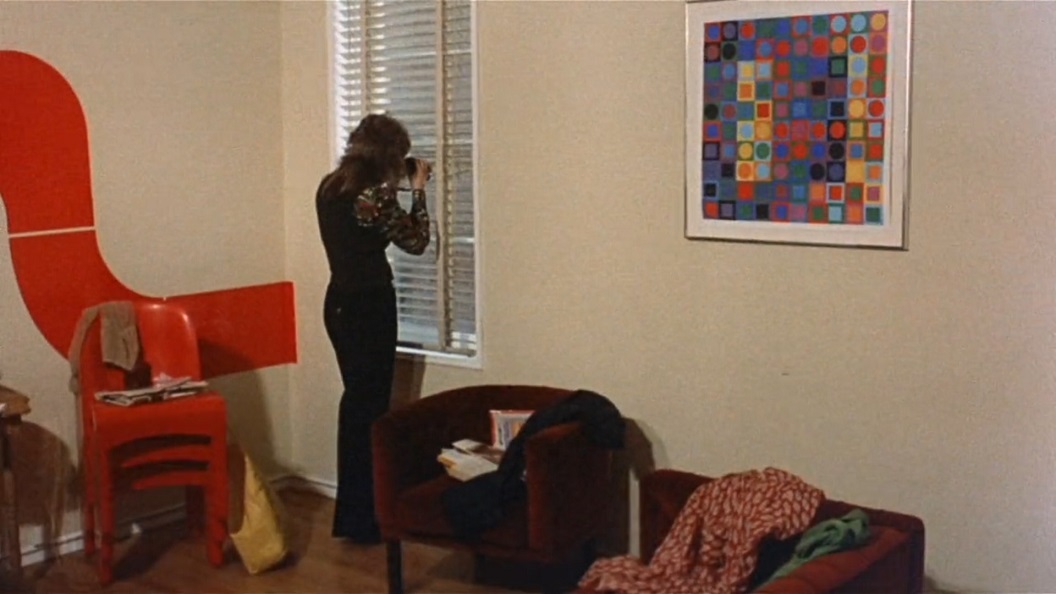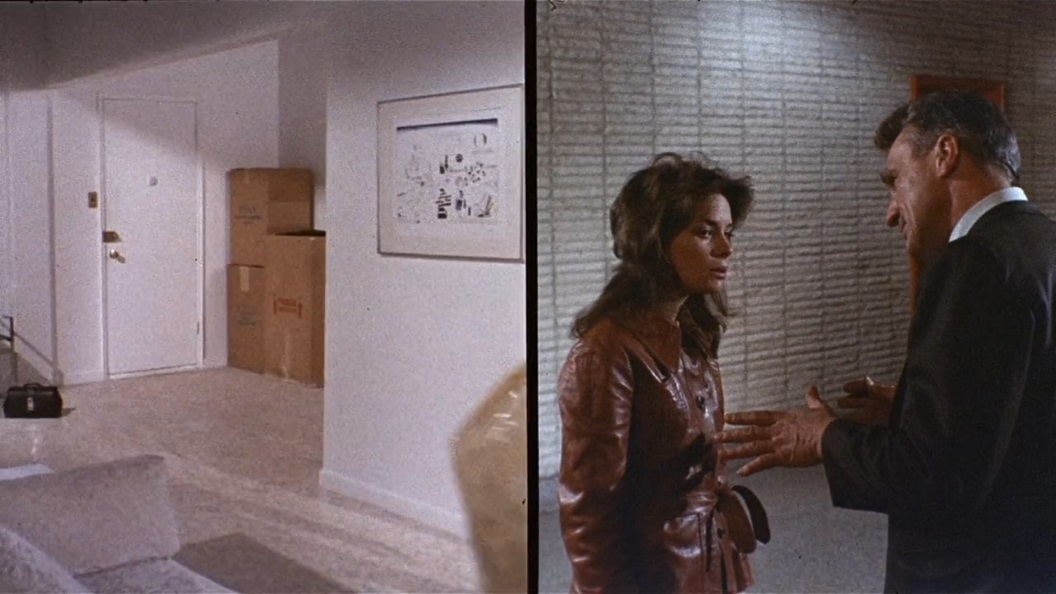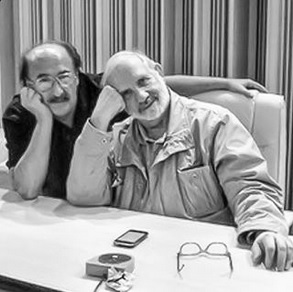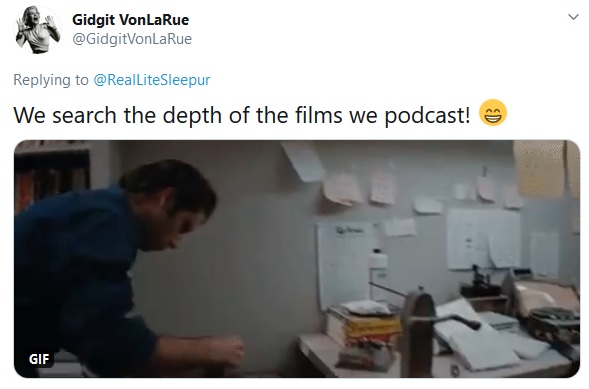AND, "STRICTLY BY CHANCE", MCQUARRIE CREW IN ROME HOLDS LENS USED IN DE PALMA'S FILM
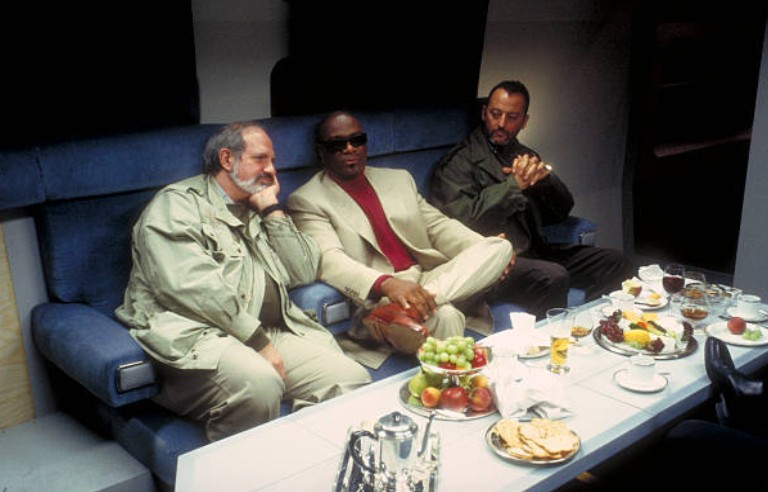
Earlier this month, the podcast Light The Fuse (hosted by Drew Taylor and Charles Hood) interviewed David Koepp about his work on Brian De Palma's Mission: Impossible. Listen for some good discussion of how the sceenplay was developed, some fun stories, and Koepp's lovingly-rendered and highly amusing "De Palma" voice. The interview is podcast in two parts. I haven't yet listened to Part 2, which delves into "several further unrealized reunions with Brian De Palma," but here's a bit of a transcript from Part 1:
Were you brought onto the project by De Palma?Yes. Brian and I had done Carlito's Way together a couple of years prior to that, and we had gotten along great. And I was about to do... I had just finished Lost World, I think... and I was about to start, I was gonna do Shock Corridor. Remember the Sam Fuller movie? Yeah. Uh, somebody was going to remake it at Disney. I can't remember the producer. And is there's one thing that seems perfectly suited, it's Shock Corridor and Disney. [laughter] And I... but I had an idea for, you know, a journalist who goes in and can't get out. You know, I thought it was going to be kind of cool. And I think we were negotiating, or talking... somebody was trying to convince somebody to do it. And, I got a call from Brian, who said, you know, it was pre-cell phones, or mostly pre-cell phones. So I remember calling him back from a restaurant. And I said, "What? What is so urgent?"
He said, "What are you doing?"
...
I said, "I'm eating."
And he said, "No, no, what are you writing?"
"I think I'm going to write Shock Corridor at Disney."
And he said, "Huh!? Shock Corridor? That's a terrible idea!"
I said, "Brian, did you just call me to berate me? I'm eating!" You know.
And he says, "Mission: Impossible. Tom Cruise. I have to see you in the morning."
[laughter]
And, uh, the rest is history.
Was there any material at that point? Because we've heard that, you know, Sydney Pollack and some other people had been flirting with the idea before.
Yeah, there were several pieces of material. There was a script that Willard Huyck and Gloria Katz had written. And then subsequent to that, there was a treatment that Brian had done with Steve Zaillion. But Zaillion had to go, because he either... but I've never asked him directly... either he had to go because he had another commitment, or he had to go because he got a whiff of [starts to laugh] what it was going to be like working with Tom and Brian, and perhaps a certain lack of freedom that he might have enjoyed. And so he left. But I came in and then Brian and I reworked the treatment, because it had been a first draft, but also I had some other ideas. Nobody could ever just do somebody else's thing, you gotta wreck it, so Brian and I worked through another treatment and then I wrote some scripts.
Did you read that original script?
Which original one?
The Katz? Sure! Yeah, I did. It wasn't the direction that I wanted to go. But it had a lot of good things in it.
Did any of it manage to make its way into the movie? Anything from that draft?
Uh, I don't believe so, no.
Okay...
Oh, wait, his first name. I think he was Ethan in their draft. But I think he... he remained Ethan, and Hunt was mine, because Hunt seems like a cool name. But that wasn't the coolest name-- I was very happy with Luther Stickell. It's one of my favorite character names that I've made up. That was Ving Rhames' character.
And it's hung around for a long time now.
Yeah, there's a funny story about that-- yo want to hear it?
Yes!
I figure this is the place, right? So, we were in Prague right before shooting. So we were doing rehearsals. And it was fascinating, because Prague had just reopened in the mid- '90s, you know, after the fall of communism. And so we were staying-- Brian had this room at a hotel that we were all staying in that was like where the politburo must have stayed when they came to town. You know, it was this gigantic room with a huge conference table with a giant map of Europe at the end of it. And I mean, you could just picture, you know, like Brezhnev up at the map, you know, talking about where they wanted to go next. It was a really cool room. So anyway, we were rehearsing, and we got to the end, and the, yo know, the script had been through its turbulent life, and, you know, there's more turbulence to come. But it was in a pretty good state, and everybody was pretty cool at that point and we were ready to start shooting. And we were finishing our rehearsal, and Brian said, "Anybody got anything else?"
And Ving Rhames said, "Yeah, I got a question."
We said, "Okay. What's the question?"
He said, "How come the black guy gotta die?"
And we said, "Well, you know, a number of people die. You know, it's not just him."
And he said, "Yeah, yeah, but, how come the black guy always gotta die?"
And we were like, "Oh. Okay, Ving, you're right." So we kept him alive. And what I think is hilarious about it is seven movies later, Ving's still there. He was not only right about the note, but he also, in terms of career longevity, was right about staying alive.
Yeah. Where was he supposed to die in the script? Do you remember?
On the train at the end. It was all very exciting.
Well, should we start talking about the turbulence of this script?
Sure
So why was it turbulent even before you told Ving Rhames that he got to live? I mean, where was it at that stage?
There was... you know, there's two very strong personalities at the center-- well, more than two, but the, you know, the two dominant personalities at the center of the movie were Tom and Brian. And they liked each other very much, and they also disagreed a lot. You know, Brian has a really clear viewpoint on things. You know, he is an auteurist, no question. Brian gets to be called an auteur because he writes half his own stuff, but even on the stuff he doesn't write, it's an extremely clear point of view and he's one of the few directors where you can look at a shot and say, oh, it's a Brian De Palma movie. And that's rare. And you hire somebody for that, and then you... it's very hard for them to just give it up. And Tom, I think, both wanted to respect that and struggled with it, because he didn't always agree with the viewpoint. And he had a very clear idea, and he was producing the movie and also had a very clear idea about what he thought it should be. So you know, you just had two brilliant guys who a lot of the time would get along great and were great allies, and sometimes wouldn't. I think Tom also felt quite a bit of anxiety about it. It was going to be a great big expensive movie, and he was producing the movie, which he was doing with Paula Wagner, for the first time. And so there was a, you know, really high degree of personal responsibility for it. And as personally responsible as Tom Cruise feels about every single thing he does and every single person that he meets throughout his entire life, if you could multiply that by a few, for this, the first giant movie that he was producing and starring in and creating a franchise from... you now, there's a certain level of attentiveness there.
And so Brian and I had done a thing together, and we had a relationship where we trusted each other. And so, there was a dynamic. Maybe he felt it was two-on-one. Now granted, there was two of us, and then there was one of Tom Cruise, so, it could have been 50 of us, it wouldn't necessarily have mattered. He's got an extremely strong personality and point of view. And then I think what happened is the studio made a sort of... Sherry Lansing was running the studio at the time, and she made what I think was a tiny bit of a mistake in terms of working with Tom, which was to say, at a certain point, "We love the script-- we don't have any notes."
And I think that makes a person nervous. Especially of you're a person who's used to working on something exhaustively. You know, Brian and I had no intention of stopping, but I think he heard, "We don't have any notes," and he thought, oh, they're just going to try to jam me into this and get it out, because it's a title, you know, it's a big thing. And so at that point then he wanted to bring in Bob Towne to work on it, and I didn't like that, you know. Because I was also young, and I didn't like anybody touching my stuff, and I didn't realize that perhaps you shouldn't work on hundred-million dollar movies if you don't want anybody touching your stuff. [Laughter] And so, you know, there was a lot of back-and-forth at that point-- the next several months, as Towne did his thing, and then I'd come back and do more of my thing, and then a some point, we're both on the movie, but at different hotels in London. You know, the studio's maybe going to shut it down, or maybe they're not, there's pages flying everywhere, I was staying up for three days at a time trying to combine things. And it was sort of chaotic. It was chaotic-- it wasn't sort-of-chaotic.
That was leading up to the production? All that?
Yeah, that was all before cameras ever rolled. Once cameras rolled, it settled down, as things tend to. There were still, you know, last-minute rewrites and things like that, but there wasn't the sort of... it didn't have that feeling, a little bit of the wild west prior to production.
What was the biggest logjam, in terms of... was there a set-piece or something that caused that caused all this to happen, or was it just rewriting the script again and again? Or what was the hold-up?
Just rewriting the script again and again. And I think because it was a complicated plot, and we all wanted it to be a complicated plot. But you kind of have to all agree on what the complicated plot is, and how much complication is too much. And I remember one day we had... there was an opening, you know, which was quite extensive, and jam-packed full of exposition and death and reversals and set-ups-- you know, it's a very complex piece of writing that starts, you know, with a story inside a story that turns out to be a fake, and then these people are all running a thing, but somebody's running a thing on them. And I remember getting into a disagreement with Tom about... there was one security guard who had no lines. He had to push a button.
And he said, "Well, who's that guard?"
I said, "That's... the guard, who works there."
And he said, "No, no, no, but who is he really?"
And I said, "No, he really is the guard who works there."
And he said, "Yeah, but wouldn't it be better if he wasn't the guard who works there, but he's actually somebody else, and we find out who it is, and Ethan figures out that that's who it is because of..."
And I'm like, "No, it wouldn't be better, because Ethan just needs to walk through the door!"
[Laughter]
You know, and then that would lead to an hour of discussion.
Wow.
He might-- but, I'm sure he doesn't remember, but if he did, he might tell the story in a different way. But, you know, we all have our opinions.
What did you think when the movie came out and people said it was still too complicated?
[Laughter] That's a... Brian called me the day after it came out and he said, "Dave! [can't stop laughing] There's a one-word buzz on this movie. 'Incomprehensible.'"
[more laughter]
"No, no. no, it's supposed to be complicated. This is okay. People are gonna love it. And..."
[more laughter]
Well, you have this amazing archive on your website of your old scripts. A lot of scripts, and you have multiple drafts of Mission: Impossible, and we had a chance to take a peek at them. So I wanted to just ask a couple questions about how certain things evolved. I mean, I think maybe the biggest thing is the romance between Ethan and Claire. And, you know, it was more explicit in earlier drafts. I think in the earliest draft you posted on your website, the two of them are having an affair right from the beginning, and it's hidden from Phelps, and Ethan's deciding whether or not, in the opening of the movie, "Should I..." You know, he's trying to grapple with whether or not he wants to to reveal that to Phelps.] And then as more drafts come in, that gets shaded back. And then, to the final shooting script, then it's obviously very close to what ended up in the movie, except for one thing, is that they have sex on the train. They make love on the train. It's implied they do, in the middle of the movie, right before the Langley heist, I think is when it happens. So I just wanted to ask you about the evolution of the Claire-Ethan romance, and what decisions went into why it was scaled back, and stuff like that.
It was a little while ago, so I, you know, I may not remember clearly why. I remember that that's how it was originally. I'm not sure I remember how I lost that fight. Because I liked them having an affair. I liked that they were sleeping together, and I liked that he was morally compromised. And I thought that that was going to be fascinating. And, you know, having an affair with the wife or girlfriend... I can't remember, I think wife... the wife of your mentor-- that's not so good. And it gets into some... you know, Arthur, Guinevere, Lancelot, there's some very nice triangly stuff in there, and I love t write triangles. I think that, you know, somebody involved maybe didn't want to play that. So I think in the end the thinking was, no, no, they're not having an affair, but Phelps' treachery and jealousy actually causes the thing to happen that he was most afraid of, which is that they end up together.
Right.
Which is fine, too. And obviously the movie did well, and no one was injured during filming, so that's good. [laughter] I liked that he was having an affair. I thought that would have been kind of fun.
Did they shoot the scene on the train? Did they shoot that, where the two of them consummate their romance before the Langley heist?
I don't believe so. Before the Langley heist, in the middle of the movie, maybe.
Yeah.
It's on that train. Right.
Yeah, it's on the train where we first meet Krieger and Luther...
Right.
And they run down the whole scheme of what they're going to do, and then there's a scene in the train there in the shooting script that you have on your website that the two of them have a little conversation after that scene, and then they...
Yeah. I thought the best sequence in that section of the movie-- that I hope was in the first draft that you read-- was the rounding up the team sequence.
Right.
Was that in there, where he, you know...
I think that's in your second draft.
Yeah, somebody's busted out of a prison in India.
Yes.
Yeah, there's an extended seven or eight page rounding up the team sequence, when, after, you know, Ethan's team's all been killed, and he's off now on his own, and he has to go figure out who's done this and why, but of course, he needs people to help him. So he, you know, every great team movie has a rounding-up-the-team sequence. You know, it's Guns Of Navarro, and it's, well, it's a million of them. So, Brian and I had come up with what we thought was fun and funny and adventurous, and had some good size to it. And it just died in the last minute, because of budget. You know, it was a very expensive sequence, but it made me so sad because I particularly liked the prison break in India. I thought it was a great idea for how to bust somebody out of prison. You go see them, you shoot them with a dart that they don't even know about so they think they're dead. And then the prison takes them up to the roof to cremate them and you rescue them with a helicopter. It's great! Because a guy wakes up in a coffin and he's sliding toward flames. That... [laughter] that seemed like a lot of fun to me.
There was also another team member, right?
Yes, who was it...
Paul... I want to say Mitnik?
Oh, right, the computer guy. Sort of combined names with Luther Stickel. Yeah. Yeah yeah yeah. As one of those Spider-Man movies came to call him, the guy in the chair. I like to think that we had an early guy in the chair in Luther.
Yes.
There's always a guy in the chair. Yeah, it was a shame we lost that sequence. Imagine how well the movie would have done if we'd had it. [laughter]
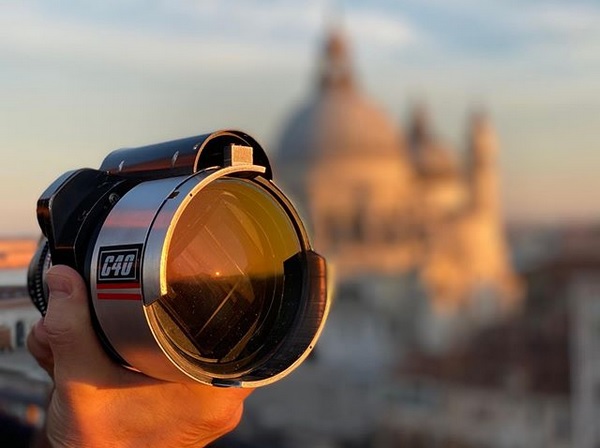
Meanwhile, Christopher McQuarrie, currently in Rome filming the seventh Mission: Impossible film, posted the picture above today on his Instagram page, with the following caption:
There is no escaping the past…**With us strictly by chance, the lens used to shoot Ethan’s meeting with Max some 25 years ago in Brian De Palma’s Mission: Impossible.
Updated: Thursday, October 29, 2020 12:33 AM CDT
Post Comment | View Comments (3) | Permalink | Share This Post




